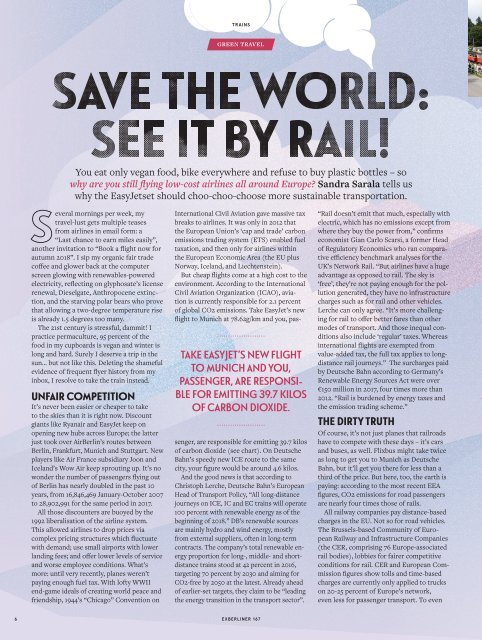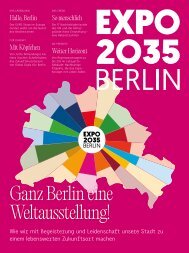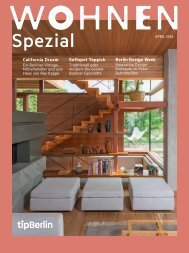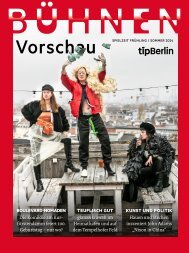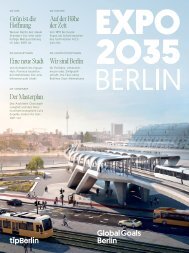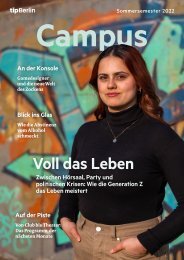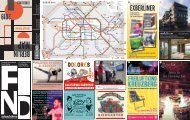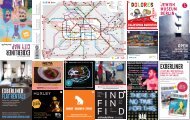Exberliner Issue 167, January 2018
Create successful ePaper yourself
Turn your PDF publications into a flip-book with our unique Google optimized e-Paper software.
TRAINS<br />
GREEN TRAVEL<br />
You eat only vegan food, bike everywhere and refuse to buy plastic bottles – so<br />
why are you still flying low-cost airlines all around Europe? Sandra Sarala tells us<br />
why the EasyJetset should choo-choo-choose more sustainable transportation.<br />
everal mornings per week, my<br />
travel-lust gets multiple teases<br />
from airlines in email form: a<br />
“Last chance to earn miles easily”,<br />
another invitation to “Book a flight now for<br />
autumn <strong>2018</strong>”. I sip my organic fair trade<br />
coffee and glower back at the computer<br />
screen glowing with renewables-powered<br />
electricity, reflecting on glyphosate’s license<br />
renewal, Dieselgate, Anthropocene extinction,<br />
and the starving polar bears who prove<br />
that allowing a two-degree temperature rise<br />
is already 1.5 degrees too many.<br />
The 21st century is stressful, dammit! I<br />
practice permaculture, 95 percent of the<br />
food in my cupboards is vegan and winter is<br />
long and hard. Surely I deserve a trip in the<br />
sun... but not like this. Deleting the shameful<br />
evidence of frequent flyer history from my<br />
inbox, I resolve to take the train instead.<br />
UNFAIR COMPETITION<br />
It’s never been easier or cheaper to take<br />
to the skies than it is right now. Discount<br />
giants like Ryanair and EasyJet keep on<br />
opening new hubs across Europe; the latter<br />
just took over AirBerlin’s routes between<br />
Berlin, Frankfurt, Munich and Stuttgart. New<br />
players like Air France subsidiary Joon and<br />
Iceland’s Wow Air keep sprouting up. It’s no<br />
wonder the number of passengers flying out<br />
of Berlin has nearly doubled in the past 10<br />
years, from 16,846,469 <strong>January</strong>-October 2007<br />
to 28,902,991 for the same period in 2017.<br />
All those discounters are buoyed by the<br />
1992 liberalisation of the airline system.<br />
This allowed airlines to drop prices via<br />
complex pricing structures which fluctuate<br />
with demand; use small airports with lower<br />
landing fees; and offer lower levels of service<br />
and worse employee conditions. What’s<br />
more: until very recently, planes weren’t<br />
paying enough fuel tax. With lofty WWII<br />
end-game ideals of creating world peace and<br />
friendship, 1944’s “Chicago” Convention on<br />
TAKE EASYJET’S NEW FLIGHT<br />
TO MUNICH AND YOU,<br />
PASSENGER, ARE RESPONSI-<br />
BLE FOR EMITTING 39.7 KILOS<br />
OF CARBON DIOXIDE.<br />
International Civil Aviation gave massive tax<br />
breaks to airlines. It was only in 2012 that<br />
the European Union’s ‘cap and trade’ carbon<br />
emissions trading system (ETS) enabled fuel<br />
taxation, and then only for airlines within<br />
the European Economic Area (the EU plus<br />
Norway, Iceland, and Liechtenstein).<br />
But cheap flights come at a high cost to the<br />
environment. According to the International<br />
Civil Aviation Organization (ICAO), aviation<br />
is currently responsible for 2.1 percent<br />
of global CO2 emissions. Take EasyJet’s new<br />
flight to Munich at 78.62g/km and you, passenger,<br />
are responsible for emitting 39.7 kilos<br />
of carbon dioxide (see chart). On Deutsche<br />
Bahn’s speedy new ICE route to the same<br />
city, your figure would be around 4.6 kilos.<br />
And the good news is that according to<br />
Christoph Lerche, Deutsche Bahn’s European<br />
Head of Transport Policy, “All long-distance<br />
journeys on ICE, IC and EC trains will operate<br />
100 percent with renewable energy as of the<br />
beginning of <strong>2018</strong>.” DB’s renewable sources<br />
are mainly hydro and wind energy, mostly<br />
from external suppliers, often in long-term<br />
contracts. The company’s total renewable energy<br />
proportion for long-, middle- and shortdistance<br />
trains stood at 42 percent in 2016,<br />
targeting 70 percent by 2030 and aiming for<br />
CO2-free by 2050 at the latest. Already ahead<br />
of earlier-set targets, they claim to be “leading<br />
the energy transition in the transport sector”.<br />
“Rail doesn’t emit that much, especially with<br />
electric, which has no emissions except from<br />
where they buy the power from,” confirms<br />
economist Gian Carlo Scarsi, a former Head<br />
of Regulatory Economics who ran comparative<br />
efficiency benchmark analyses for the<br />
UK’s Network Rail. “But airlines have a huge<br />
advantage as opposed to rail. The sky is<br />
‘free’, they’re not paying enough for the pollution<br />
generated, they have no infrastructure<br />
charges such as for rail and other vehicles.<br />
Lerche can only agree. “It’s more challenging<br />
for rail to offer better fares than other<br />
modes of transport. And those inequal conditions<br />
also include ‘regular’ taxes. Whereas<br />
international flights are exempted from<br />
value-added tax, the full tax applies to longdistance<br />
rail journeys.” The surcharges paid<br />
by Deutsche Bahn according to Germany’s<br />
Renewable Energy Sources Act were over<br />
€150 million in 2017, four times more than<br />
2012. “Rail is burdened by energy taxes and<br />
the emission trading scheme.”<br />
THE DIRTY TRUTH<br />
Of course, it’s not just planes that railroads<br />
have to compete with these days – it’s cars<br />
and buses, as well. Flixbus might take twice<br />
as long to get you to Munich as Deutsche<br />
Bahn, but it’ll get you there for less than a<br />
third of the price. But here, too, the earth is<br />
paying: according to the most recent EEA<br />
figures, CO2 emissions for road passengers<br />
are nearly four times those of rails.<br />
All railway companies pay distance-based<br />
charges in the EU. Not so for road vehicles.<br />
The Brussels-based Community of European<br />
Railway and Infrastructure Companies<br />
(the CER, comprising 76 Europe-associated<br />
rail bodies), lobbies for fairer competitive<br />
conditions for rail. CER and European Commission<br />
figures show tolls and time-based<br />
charges are currently only applied to trucks<br />
on 20-25 percent of Europe’s network,<br />
even less for passenger transport. To even<br />
6<br />
EXBERLINER <strong>167</strong>


